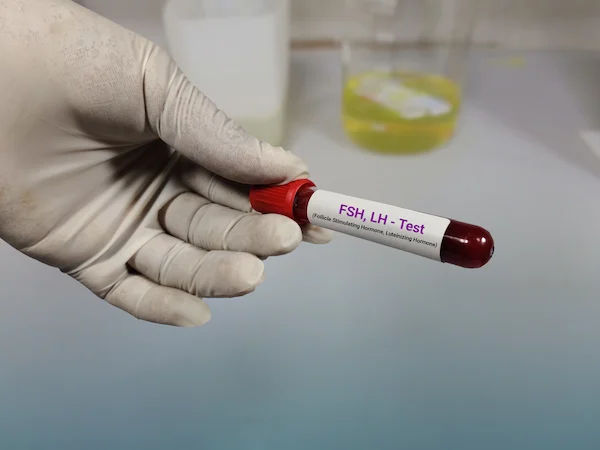Understanding SHBG and Its Implications
Discover what Sex Hormone-Binding Globulin (SHBG) is, how it affects hormone balance, and its role in conditions like PCOS, menopause, and diabetes.

Written by Dr. Siri Nallapu
Reviewed by Dr. Rohinipriyanka Pondugula MBBS
Last updated on 2nd Sep, 2025
.webp?tr=q-80,f-webp,w-350,dpr-2,c-at_max 700w)
Sex Hormone-Binding Globulin (SHBG) might sound like a complex term, but it plays a crucial role in your body’s hormone balance. If you’ve ever had concerns about fertility, hormonal imbalances, or conditions like polycystic ovary syndrome (PCOS), understanding SHBG can help you take better control of your health.
What is SHBG?
SHBG is a protein produced by your liver that binds to sex hormones primarily testosterone and estrogen carrying them through your bloodstream. These hormones are essential for various bodily functions, including reproductive health, muscle growth, mood regulation, and bone strength.
Think of SHBG as a "transport vehicle" for these hormones. When SHBG binds to them, it regulates how much of the hormone is available for your body to use. Only the "free" (unbound) hormones are active and can affect your tissues.
Why Does SHBG Matter?
Your SHBG levels influence how much testosterone or estrogen is available for your body to use. High or low SHBG can lead to hormonal imbalances, which may cause symptoms like:
Low SHBG Levels
- Excess free testosterone (may lead to acne, excessive hair growth, or irregular periods in women).
- Increased risk of insulin resistance (linked to diabetes and PCOS).
- Lower estrogen activity (may affect bone health and mood).
High SHBG Levels
- Low free testosterone (can cause fatigue, low libido, or muscle weakness).
- Reduced estrogen availability (may lead to menstrual irregularities or fertility issues).
What Causes Abnormal SHBG Levels?
Several factors can influence SHBG levels, including:
Factors That Lower SHBG
- Obesity – Excess fat, especially around the abdomen, can decrease SHBG.
- Insulin resistance & diabetes – High insulin levels suppress SHBG production.
- High androgens (like testosterone) – Common in conditions like PCOS.
- Certain medications (like steroids or hormonal treatments).
Factors That Increase SHBG
- Aging – SHBG tends to rise with age, especially in men.
- Liver disease – Since SHBG is made in the liver, some liver conditions can increase it.
- Hyperthyroidism – An overactive thyroid can elevate SHBG.
- Pregnancy & estrogen therapy – High estrogen levels boost SHBG.
How Does SHBG Affect Health Conditions?
1. Polycystic Ovary Syndrome (PCOS)
- Many women with PCOS have low SHBG, leading to high free testosterone, which contributes to symptoms like acne, excess hair growth, and irregular periods. Improving SHBG levels through diet and lifestyle changes can help manage PCOS.
2. Menopause & Low Testosterone in Men
- As men age, SHBG increases, reducing free testosterone, which can lead to fatigue, low libido, and muscle loss. Women in menopause may also experience hormonal shifts due to changing SHBG levels.
3. Diabetes & Metabolic Health
- Low SHBG is linked to insulin resistance, increasing the risk of type 2 diabetes. Managing SHBG through weight loss and a balanced diet can improve metabolic health.
How Can You Manage SHBG Levels?
While you can’t directly control SHBG, certain lifestyle changes can help balance it:
1. Maintain a Healthy Weight
- Losing excess fat, especially around the abdomen, can increase SHBG and improve hormone balance.
2. Eat a Balanced Diet
- Fiber-rich foods (whole grains, vegetables, legumes) help regulate insulin and SHBG.
- Healthy fats (avocados, nuts, olive oil) support hormone production.
- Limit sugar & refined carbs – Excess sugar lowers SHBG.
3. Exercise Regularly
- Strength training and moderate cardio can improve insulin sensitivity and help regulate SHBG.
4. Manage Stress & Sleep Well
- Chronic stress and poor sleep can disrupt hormones, indirectly affecting SHBG.
When Should You Get Tested?
If you experience symptoms like:
- Unexplained weight gain or fatigue
- Irregular periods or fertility issues
- Low libido or mood swings
- Signs of excess testosterone (acne, hair growth in women)
A simple blood test can measure your SHBG levels. Your doctor may also check free testosterone, estrogen, and other hormones for a complete picture.
Need Help?
If you suspect a hormonal imbalance, consider booking a consultation with an endocrinologist or gynecologist. You can easily schedule a test or doctor’s appointment through Apollo 24|7 for personalized guidance.
Get Your Health Assessed
Final Thoughts
SHBG is a small but mighty protein that helps regulate your sex hormones. Whether you're dealing with PCOS, menopause, or metabolic concerns, understanding SHBG can empower you to take steps toward better hormonal health. Simple lifestyle changes like eating well, staying active, and managing stress, can make a big difference.
If you have concerns about your hormone levels, don’t hesitate to seek medical advice. Your hormones play a vital role in your overall well-being, and keeping them balanced is key to feeling your best!
Would you like to check your SHBG levels? Book a test now and take the first step toward understanding your hormonal health!
Consult an Gynaecologist for the best advice
Consult an Gynaecologist for the best advice

Dr Hymavathi Kaliki
Obstetrician and Gynaecologist
45 Years • MBBS, DGO, MD (Obstetrics & Gynaecology), FICS -USA (Fellowship - International College of Surgeons - Obstetrics & Gynaecology), FART (Fellowship - Assisted Reproductive Technology)
Visakhapatnam
Apollo 24|7 Clinic - Andhra Pradesh, Visakhapatnam

Dr. Veena H
Obstetrician and Gynaecologist
16 Years • MBBS DGO
Bangalore
Apollo 24|7 Clinic - Karnataka, Bangalore

Dr. G Sireesha
Obstetrician and Gynaecologist
8 Years • MBBS, DGO
Visakhapatnam
Apollo 24|7 Clinic - Andhra Pradesh, Visakhapatnam
Dr. Sushmita Misra
Obstetrician and Gynaecologist
24 Years • MBBS, MD
New Delhi
RAINBOW WELLNESS CENTRE, New Delhi

Dr. Smita Ghatak
Obstetrician and Gynaecologist
10 Years • MBBS, DGO, DNB Obstetrics & Gynaecology
New Town
Prime Diagnostic and Polyclinic, New Town



.webp)